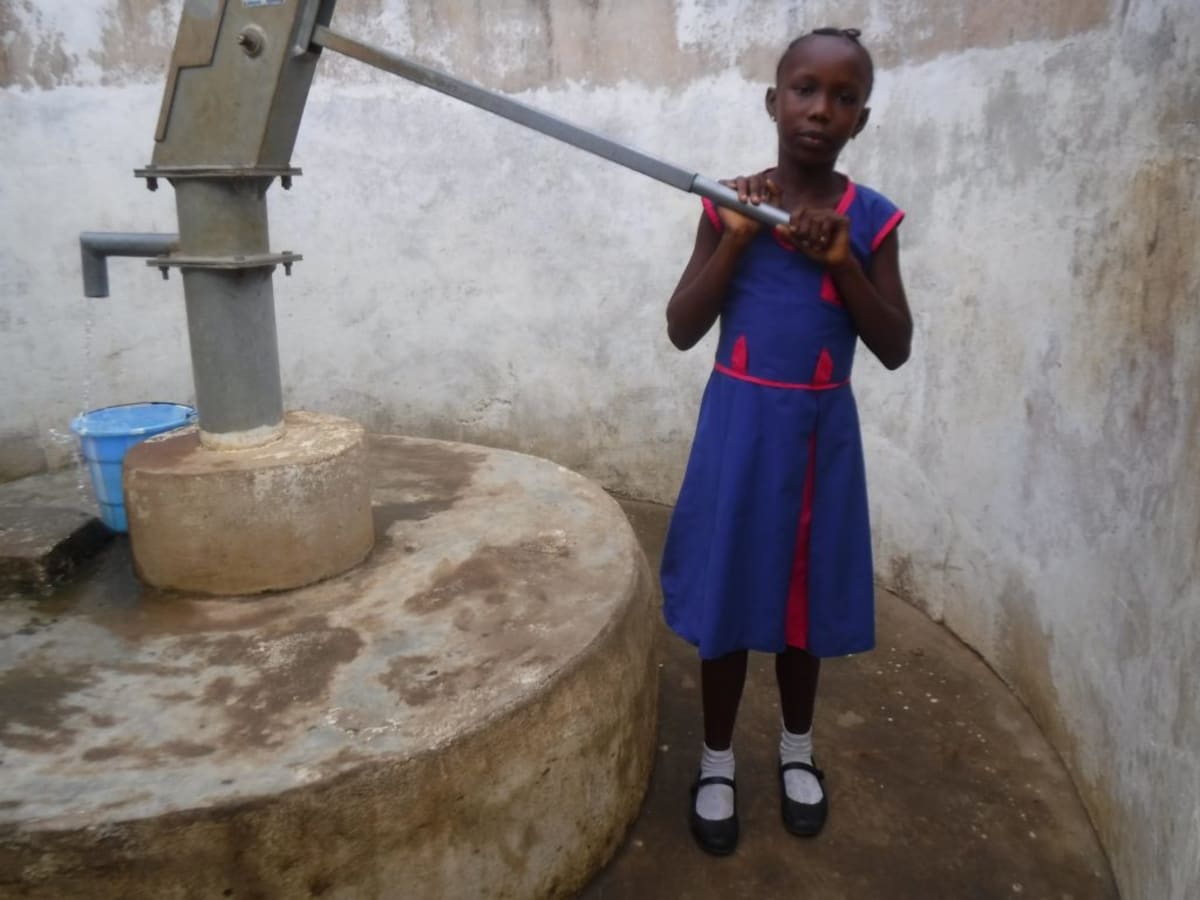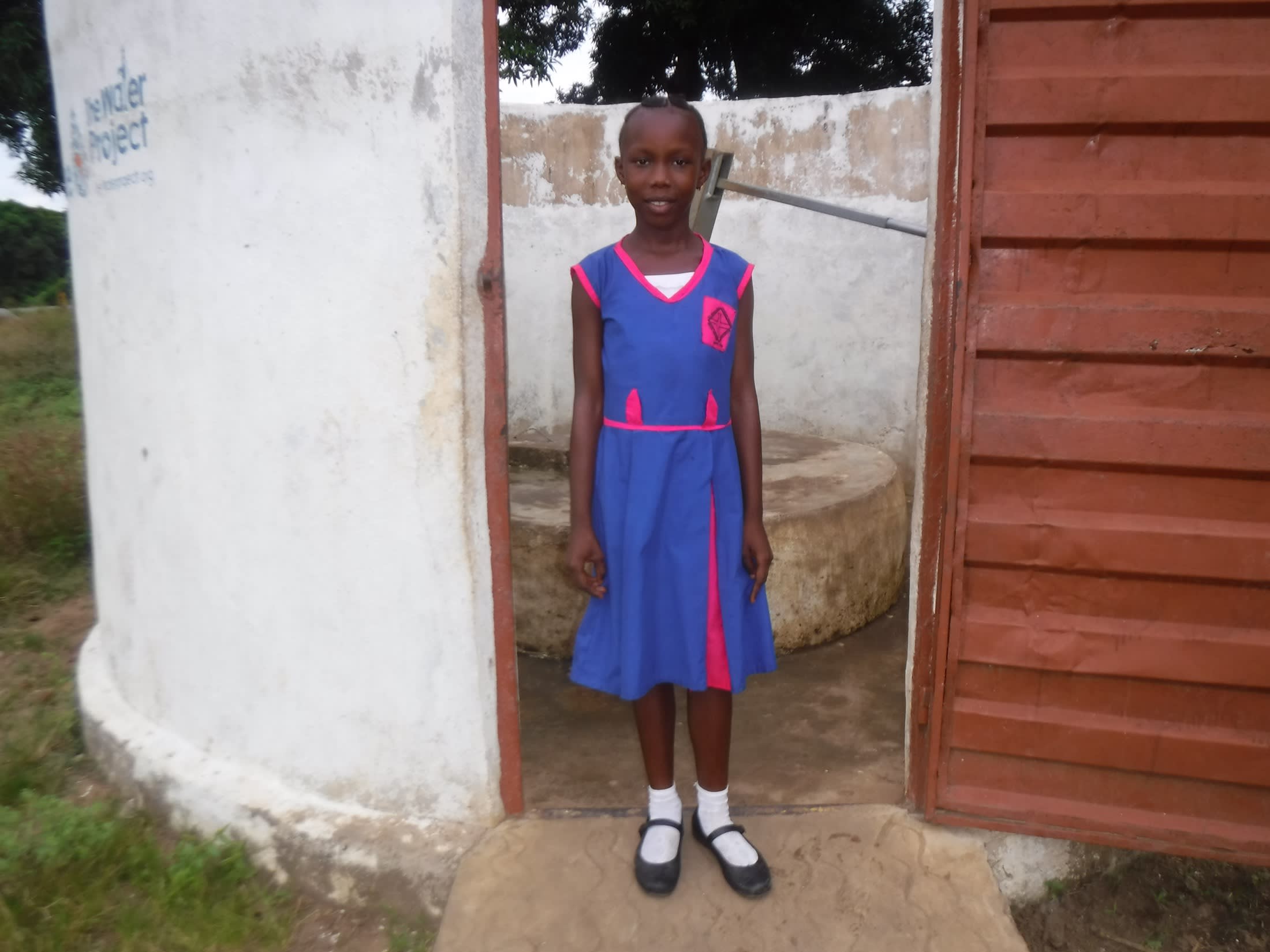January, 2022: St. Monica's RC Primary School Well Rehabilitation Complete!
We are excited to share a safe, reliable water point at St. Monica's RC Primary School in Sierra Leone is now providing clean water to students and neighboring community members! We also conducted hygiene and sanitation training, which focused on healthy practices such as handwashing and using latrines.

"I am happy for the good water we are now getting from our school well. Now, it is good that the school pump has been renewed and the water is clean and pure to drink. I will no longer be scared to drink water from the school pump," said Ibrahim S., 13.
We held a dedication ceremony to officially hand over the well to the community members. The ceremony was attended by local dignitaries from the Ministry of Water Resources, the Port Loko District Council, a Lungi Tardi community elder, school pupils, and teachers. Each official gave a short speech thanking everyone who contributed to the rehabilitation of the water project. Then, Mrs. Mary Vandi, the school's headteacher, and Ibrahim S., a student, made statements on their community's behalf. The ceremony concluded with celebration, singing, and dancing.

Headteacher Mary Vandi, in the blue dress, celebrates clean water with students.
"Thank God for this great opportunity. It is good that Mariatu's Hope and The Water Project have added value to our school water well. It is now quite safe to drink. This is going to prevent us from drinking contaminated water," said Mary Vandi.
Clean Water Restored
The drill team arrived the day before beginning work. They set up camp and unpacked all of their tools and supplies to prepare for drilling the next day. The community provided space for the team to store their belongings, along with meals for the duration of their stay. The following day, the work began.
First, we raised the tripod, the structure we use to hold and maneuver each of the drilling tools. Next, we measured the well's original depth. We then socketed the pipes and installed a casing.

Finally, we lined up the drill rods and started to drill! We reached a final depth of 14 meters with water at nine meters. The hand-drill method allowed the team to install the cylinder far below the aquifer so that the community has great water access throughout the year.

With drilling complete, we installed screening and a filter pack to keep out debris when the water is pumped. We then cemented an iron rod to the well lining and fixed it with an iron collar at the top. Next, we bailed the well by hand for three days and flushed it, clearing any debris generated by the drilling process. Finally, we tested the yield to ensure the well would provide clean water with minimal effort at the pump.

Chlorination.
As the project neared completion, we built a cement platform, walls, and drainage system around the well to seal it off from surface-level contaminants. The drainage system helps to redirect runoff and spilled water to help avoid standing water at the well, which can not only be uncomfortable but unhygienic and a breeding ground for disease-carrying mosquitoes.

At last, we installed the stainless steel India Mk11 pump and conducted a water quality test. The test results showed that this is clean water fit for drinking!
Mary Vandi, the school's headteacher, commented, "This well will help the school to do a fruitful garden activity at the school. It is part of the school requirement because teaching the students about agriculture needs practical evidence. The school now has enough water to do the school garden for the students to see it and put them into practice."
New Knowledge
Before conducting the 5-day hygiene training, we made arrangements with the school administration to decide when the training would be most beneficial.
After this preparatory period, we scheduled a time and then dispatched our team, Fatmata Kalokoh and Joseph Kamara, who led the training of 225 students and teachers. The training was held in one of the classrooms at the far end of the school building because it had enough benches and proper ventilation for everyone to feel comfortable.

Training topics covered included handwashing and tippy taps, good and bad hygiene habits, disease transmission and prevention, worms and parasites, dental hygiene, proper care of the well's pump, keeping the water clean, the cost recovery system, dish racks and clotheslines, the importance of toilets, keeping latrines clean, balanced diets, the diarrhea doll, and HIV and AIDS.

Learning proper handwashing with a tippy tap.
One of the more memorable training topics was learning about good hygiene practices versus bad ones. A teacher showed students a poster of a clothesline and explained that drying clothes on the ground or the grass is not a good hygiene practice. A girl turned to her friend seated close to her and said, "I never knew that drying clothes on the ground is not fine."
Her friend replied, "Are you in the habit of drying clothes on the ground?"
She said, "Yes, my mother always dries our clothes on the ground. When I go home, I will advise her to buy rope to start drying our clothes on a clothesline. I will stop drying my clothes on the grass. I never knew I would contact skin disease by drying cloth on the grass."

Teachers attend training.
Ibrahim S. shared his thoughts on the training. "The training has helped me to learn many things about COVID-19, such as how to wash my hands without getting other germs. With this training, I will train my parents at home on most of the things I have learned."

Ibrahim.
We asked Ibrahim what it was like to be out of school due to COVID-19. "When schools closed for almost a whole academic year, I lagged behind as I was only involved in playing, selling, and not studying. While at home, I missed my teachers, my friends, the fun in school, and most of all, my encouraging headmistress."
Now that he is back to school, he said, "When schools reopened, I was filled with joy and happiness simply because [I] am back to my learning and all my friends and teachers who I have not seen for many months are all back and safe from COVID-19."
When an issue arises concerning the well, community members are equipped with the necessary skills to rectify the problem and ensure the water point works appropriately. However, if the issue is beyond their capabilities, they can contact our field officers to assist them. Also, we will continue to offer them unmatchable support as a part of our ongoing monitoring and maintenance program.
Thank you for making all of this possible!



 Borehole Well and Hand Pump
Borehole Well and Hand Pump
































